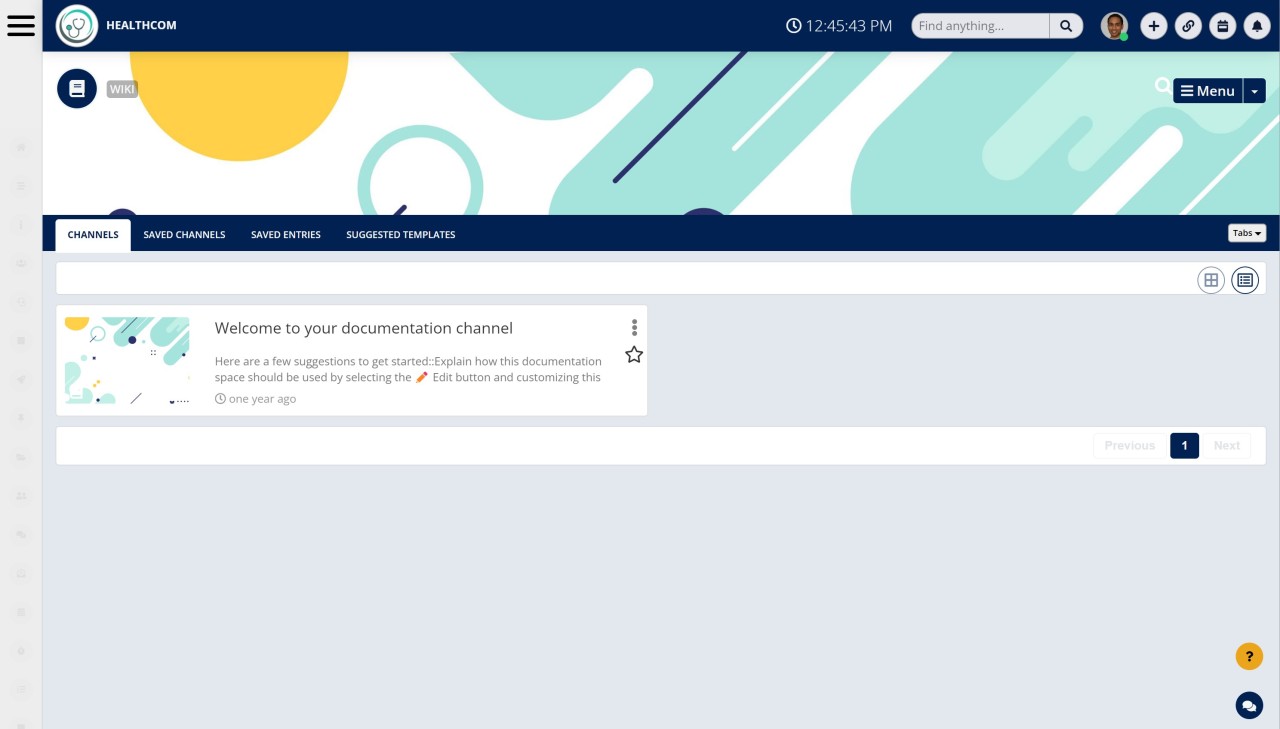Insight Blog
Agility’s perspectives on transforming the employee's experience throughout remote transformation using connected enterprise tools.
10 minutes reading time
(1934 words)
Wiki vs Knowledge Base: Which One Does Your Company Need?
The use of wikis and knowledge bases is particularly common in the technology industry, where they are used to manage large amounts of complex information.
Information is one of the most crucial tools for business continuity. It helps determine strategies, form insights, and shape business processes. The ability to store and share information seamlessly across all members of the organizations boosts productivity, improves employee and customer satisfaction, and increases a company's bottom line.
In today's fast-paced and information-driven world, companies should have an effective system to manage their company's institutional knowledge. You have two main options for managing knowledge in your company; a corporate wiki or a knowledge base.
So which one does your company need?
A wiki is ideal for a company looking for a more collaborative tool for sharing and storing vast knowledge from team members. On the other hand, a knowledge base is a good choice if you're looking for an organized and structured system that offers easy information access. Consider your resources, content type, searchability, audience, and the maintenance it requires.
According to a survey conducted by Atlassian, a software development company, over 70% of respondents reported using a knowledge base or wiki in their organization. Additionally, a survey by Zendesk found that 91% of respondents reported using a knowledge base to support their customers.
The use of wikis and knowledge bases is particularly common in the technology industry, where they are used to manage large amounts of complex information.
Overall, it is clear that these tools are an important part of the modern business landscape, and their use is likely to continue to grow in the coming years.
Let's dive deeper to understand a wiki vs. knowledge base so that you can make an informed decision.
What Is a Wiki?
A wiki, or company wiki, is a type of knowledge management system that allows companies to provide a single source of knowledge. It enables the company to store, organize, and share content from multiple authors and contributors specific to your business. A wiki is also known as an "internal," "enterprise," or "business" wiki.
Ward Cunningham, also known as the father of the wiki, created the first version of a wiki website. He called it a "composition system", "discussion medium", "repository", and "tool for collaboration".
While the wiki's appearance has evolved over time, its purpose has remained largely unchanged. If you use a wiki website for your company, you can enjoy several benefits.
Wikis are used as collaborative platforms that allow users to create, edit, and share content. They are commonly used as knowledge management systems to store and organize information in a centralized location that can be accessed and edited by multiple users.
Wikis can be used for a variety of purposes, such as:
- For team members to work together on projects, share ideas, and provide feedback.
- Can be used as a repository of information where users can access, share, and update information on a particular topic.
- Used to document processes, procedures, and policies, making it easier for employees to find and follow the information they need.
- A platform for creating educational resources, including training manuals, instructional videos, and study guides.
- Wikis can be used to create online communities where users can share information, collaborate on projects, and connect with others who share similar interests.
What Is a Knowledge Base?
A knowledge base is essentially a central hub that stores information. Examples of knowledge bases include a public library, a database focused on a particular subject, and websites like whatis.com.
Regarding IT, a knowledge base is a digital resource that can be accessed online or made available online. It forms a crucial part of knowledge management systems, helping to improve the collection, organization, and retrieval of information.
A digital knowledge base is not a fixed repository of data, but instead is an ever-changing resource. It may even have the ability to learn, as a part of an expert system that uses automation or artificial intelligence.
Knowledge bases can be classified as either internal or external.
Internal knowledge bases are meant to assist employees of a company and typically contain the following types of information:
- Onboarding materials for new employees in human resources
- Guidelines for writers in content creation
- Company policies on legal matters or employee benefits
- Templates and forms
- Archived content
- Instructions on using internal applications
- Best coding practices for various tasks and jobs
What Are the Key Differences Between a Wiki and a Knowledge Base?
People usually use "wiki" and "knowledge base" interchangeably. However, the two are different. Here are the key differences between a wiki and a knowledge base:
Although an internal Wiki is commonly referred to as a Knowledge Base, they are not the same thing.
They share some similarities, but they also have distinct differences. Wikis are highly collaborative platforms where multiple contributors can create and submit content without designated editors or curators.
In contrast, Knowledge Bases are more authoritative resources with a dedicated team of content producers and managers who selectively choose contributors with specific rights to create or edit content.
Wikis can be a bit like an anarchic pirate ship with no captain, where changes can be made by anyone who can board and published instantly. This can be both a blessing and a curse. Even with fact-checkers onboard, a vast sea of writers and editors can end up making the Wiki rather disorderly and less authoritative.
On the other hand, Knowledge Bases are more tightly curated and have a more bespoke presentation, making the knowledge within more easily accessible. Because the content is more carefully managed and the presentation is more specific, Knowledge Bases can be leveraged more effectively than Wikis.
They can be customized to meet different needs and can provide more ways to leverage knowledge internally.
In summary, both Wikis and Knowledge Bases serve similar purposes, but their execution is different. People contribute to both platforms to provide clear information on products, user experience, troubleshooting, or expertise in particular topics.
However, Wikis are highly collaborative and less authoritative, while Knowledge Bases are tightly curated and more authoritative.
Wiki vs. Knowledge Base: Which One Does Your Company Need?
A wiki is a good option if you need a collaborative space where everyone can create and edit content. Wikis are also ideal for constantly changing or evolving content, as they are easy to update and revise. Wikis encourage creativity and engagement, which can increase productivity since employees have a platform for brainstorming, sharing information, and tracking progress.
A corporate wiki can be an ideal platform for projects that require input from different team members. An excellent example of a popular collaborative platform is Confluence. There are also many Confluence alternatives offering competitive features.
On the other hand, a knowledge base can be a better choice if you need a central repository for all your company's knowledge that is more structured and organized than a wiki. Knowledge bases are good for more static content that doesn't need frequent updating. This makes it suitable for documenting processes such as warehousing operations, procedures, lead generation strategies, and best practices.
A knowledge base is also ideal for storing guides, tutorials, and FAQs. With the help of the Internet of Things, a knowledge base features search functionality, categorization, and tagging to help users quickly find the necessary information in real time.
Factors to Consider When Deciding Between a Wiki and a Knowledge Base
Assessing your company's needs is essential when choosing a knowledge management system. Here are some factors to consider:
The Content You Want to Share
Which knowledge do you want your employees to store and share? A wiki is more flexible and updated than a knowledge base, making collaboration easier. So if the information you want to share is more collaborative and includes constantly evolving information, a wiki may be better. However, a knowledge base can be more appropriate if you want to store and share mostly procedural or instructional information.
How Fast Can You Retrieve the Information?
Research shows that employees use about two hours in their jobs looking for information or people they need to do their jobs. That's why easy access to information is crucial. Knowledge base platforms have a more structured and organized format, which makes searching and retrieving information fast, while data can be hard to retrieve on a wiki.
Today's e-commerce sellers are also integrating voice search into their knowledge base systems to enable easy access to information from smart devices. Although this is a technology under development, the future seems bright, with customers projected to be the greatest beneficiaries.
According to Entrepreneur, online voice shoppers are expected to increase significantly in the coming years.
Who Needs Access to the Information?
Ask yourself who will access the information. A wiki might work well for teams since it allows for easy collaboration. However, if more tasks need information retrieval, a knowledge base is the best for easy searchability. An external knowledge base can be better for customer-facing content since it's highly organized and presented in a more structured and organized way.
According to HubSpot, customers use knowledge bases for information instead of other self-service options.
How Often Will You Update the Information?
How often will the information be updated, and who will maintain it? The frequency of editing the information in a knowledge management system can help you decide which is better: a wiki or a knowledge base. Wikis will allow anyone to make updates, while knowledge bases need a designated team responsible for updating and maintaining content.
Pros and Cons of Wikis vs. Knowledge Base
Both wikis and knowledge bases are valuable tools for managing knowledge in a company. However, they have their benefits and drawbacks.
Pros of Company Wikis
- Improved collaboration and communication
- Stores vast and up-to-date information
- Increased creativity and productivity
- Cheaper to set up and maintain
Cons of Company Wikis
- Prone to inaccuracies since anyone can make edits
- Not organized like the content in a knowledge base
Pros of a Knowledge Base
- Structured and authoritative
- Fewer inaccuracies
- Easy retrieval of information
- Increased customer satisfaction and retention
Cons of a Knowledge Base
- It needs an expert to maintain
- Expensive to buy and maintain
- Information is less up to date
Conclusion: Which One Does Your Company Need?
A knowledge management system is a crucial tool for any company.
Choosing the right system can help improve employee communication, collaboration, engagement, creativity, and productivity. It can also boost customer satisfaction and retention. The two most common systems are wikis and knowledge bases. So, wiki vs. knowledge base, which one is best for your company?
A knowledge base might be the perfect choice if you're looking for a more structured, organized space that offers easy information retrieval. However, it can be expensive, less up-to-date, and does not encourage employee engagement.
On the other hand, if you want a more flexible and collaborative tool for sharing information and tracking progress, a wiki is the best fit. A wiki is always up-to-date, less expensive, and promotes communication, engagement, and creativity.
Ultimately, the best solution boils down to your organization's specific needs and use cases. Ensure you do thorough research and seek experts' advice before picking a solution for your company.
Categories
Blog
(2698)
Business Management
(331)
Employee Engagement
(213)
Digital Transformation
(182)
Growth
(122)
Intranets
(120)
Remote Work
(61)
Sales
(48)
Collaboration
(41)
Culture
(29)
Project management
(29)
Customer Experience
(26)
Knowledge Management
(21)
Leadership
(20)
Comparisons
(8)
News
(1)
Ready to learn more? 👍
One platform to optimize, manage and track all of your teams. Your new digital workplace is a click away. 🚀
Free for 14 days, no credit card required.
















